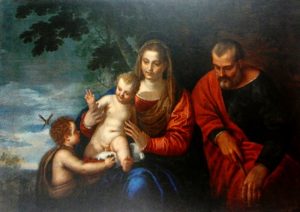Thoughts on Sunday’s Lessons for Dec. 27, 2020
First Reading: Isaiah 61:10-62:3
Joy to the world! Christmas has come, and the Word that was present at the moment of creation now brings us the light of God and dwells among us.

Holy Family with St. John the Baptist (1580s), oil painting by Benedetto Caliari (c.1538-1598). King John III Palace Museum in Wilanów, Warsaw, Poland. (Click image to enlarge.)
In the first reading for the Sunday after Christmas Day, Isaiah’s great book of prophecy has reached its closing chapters. The people have returned from exile; even if there is plenty of hard work yet to be done, the mood is joyous and exultant. The prophet shows us appealing images of the people as a joyous bridal pair looking forward to a new life together, and of God as a nurturing gardener. The reading concludes by celebrating the new Zion’s righteousness and praise for God as an example to all the nations.
Psalm: Psalm 147
God’s promises have been fulfilled! Praise the Lord, or in the original Hebrew, Hallelujah! One of the six hymns of praise and triumph that complete the Psalms, these verses ring in harmony with the Isaiah reading for the day, exulting in the people’s return from exile to rebuild Jerusalem with God’s help. Here again we see an image of God as nurturing keeper of a divine garden, sending gentle rain for grass and crops and finest wheat, nurturing food for our flocks and herds and for us all.
Second Reading: Galatians 3:23-25;4:4-7
Throughout his short letter to the Galatians, Paul argues fiercely against some in the early church who demanded that gentile converts follow the strict Jewish law. We should be careful not to interpret these words as anti-Jewish or as suggesting that the new covenant abolishes the old. But we can all celebrate his ringing conclusion to this passage. These beautiful, hope-giving verses speak of God’s Christmas gift to all humankind: We are claimed as adopted children and heirs of God through our sisterhood and brotherhood with Jesus.
Gospel: John 1:1-18
While Matthew’s and Luke’s Gospels start with the Christmas story of the birth of Jesus, and Mark’s begins with Jesus’ baptism. But John’s Gospel begins in a markedly different way, in poetic and spiritual verses that demand our attention. The book begins with the same words that begin the Bible in Genesis: “In the beginning.” This is no coincidence. John wants us to know that the same Word of God that brought the world into being now comes as Jesus to bring us the light through which we can see God. Fully human now, but always fully divine, the Word was with God from the beginning, and now lives among us. John the Baptist was sent ahead as witness to tell the world this wonderful news.
